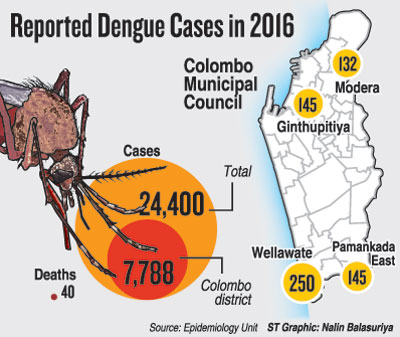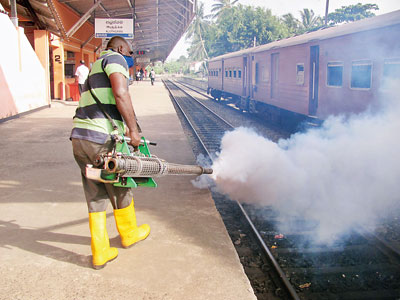News
Dengue fight goes to waste, mosquito’s blood-meal exacts heavy toll
In the past three years alone, the dengue virus has claimed 594 lives including children, while public health and municipal authorities continue to fight a losing battle to contain the menace, which now has spread to the far reaches of the island.
So far this year, 40 people have lost their lives and 23,000 have been infected.
 There is yet no WHO-prequalified vaccine for the viral illness, which can be potentially lethal. It is spread by the Aedes aegypti mosquito which bites in the day time. The WHO says peak biting periods are early mornings and in the evenings before dusk. The female mosquito bites many people during each feeding time.
There is yet no WHO-prequalified vaccine for the viral illness, which can be potentially lethal. It is spread by the Aedes aegypti mosquito which bites in the day time. The WHO says peak biting periods are early mornings and in the evenings before dusk. The female mosquito bites many people during each feeding time.
The WHO observes that epidemic dengue is a major public health problem in Sri Lanka. As deaths continue to multiply in the island, municipal officials have been sporadically spraying insecticide and trying to remove mosquito-breeding habitat. None has been effective. Yet another campaign ended Friday.
Municipal officials continue to view household garbage as a contributory factor in the spread of the dengue mosquito and have been asking households to remove stagnant water bodies through threats of fines and even a day in court.
But the WHO has informed affected countries that the eggs of another species of dengue mosquito, Aedes albopictus, can survive “for many months in the absence of water”.
The WHO also notes that people “are the main amplifying host of the virus”. Proper storage, collection and disposal of waste are essential for protecting public health, the WHO advises, recommending that this be done twice a week.
“Garbage is the main concern of health authorities and the public who are extremely worried. This is the responsibility of local governments,” said the Secretary to the Ministry of Health Anura Jayawickrama. “Prevention programmes will continue with the assistance of public health officers, police and military. Not only residences but offices, both public and private, will be thoroughly inspected and legal action would be taken against offenders.”
The Health Ministry also has made it compulsory for all schools to allocate one hour in a week to clean up.
Now that local authorities are operating under Special Commissioners as a result of yet more delay in local elections, their municipal services are in limbo.

From public announcements to fumigating the railway station: Anti dengue campain in Aluthgama. Pix by Sarath Siriwardene
This year, a majority of dengue patients were diagnosed in the Colombo district – 7,400 cases. This represents an increase of 2,800 compared with the first half of last year.
Piles of uncollected garbage in residential areas, stagnant uncovered canals, drains, pits and other water bodies providing breeding grounds for the dengue mosquito. Spots of standing water in urban areas and clogged drains at construction sites are breeding grounds, the Ministry of Health’s National Coordinator for Dengue, Dr. Hasitha Tissera said. “Most areas, especially construction sites might not even have a proper waste system.”
“I also advise residents to take a walk around their home surroundings and ensure that there are no mosquito breeding sites,” Dr Tissera said. A three-day dengue control effort took place in Colombo this week by the Health Ministry Epidemiology Unit involving the Colombo Municipal Council backed by police and armed services personnel. They inspected 31,718 premises on the first day.
CMC Chief Medical Officer Dr. Ruwan Wijeyamuni said: “We have given the residents in the area a leaflet informing them of a date on which we would be re-visiting their house to collect the containers, coconut shells, tins etc. We have also deployed 765 teams to check if there are any mosquito breeding sites.”
Cases have been reported from areas including Cinnamon Gardens, Wellawatte north, Pamankada East, Keselwatte, Ginthupitiya, Modara and Mattakkuliya. Ten suspected dengue cases were reported from the Cinnamon Gardens vicinity this month.
In Wellawate there were 250 positive cases, while Pamankada East and Ginthupitiya reported 145 cases. In Modera there were 132 cases.
 The Epidemiology Unit has so far recorded 2,123 dengue cases in Gampaha, 1,467 in Kalutara, 1,745 in Kandy, 1,372 in Jaffna, 1,293 in Kurunegala, and 1,465 in Ratnapura. In 2013, there were 35,000 cases and 349 deaths. In 2014, there were 44,460 cases with 186 deaths. And in the past year, there were 29,999 were cases with 59 fatalities.
The Epidemiology Unit has so far recorded 2,123 dengue cases in Gampaha, 1,467 in Kalutara, 1,745 in Kandy, 1,372 in Jaffna, 1,293 in Kurunegala, and 1,465 in Ratnapura. In 2013, there were 35,000 cases and 349 deaths. In 2014, there were 44,460 cases with 186 deaths. And in the past year, there were 29,999 were cases with 59 fatalities.
“There are several dengue patients at the National Hospital and they need to remain under the cover of a mosquito net,” National Hospital Director Dr. Anil Jasinghe said.

